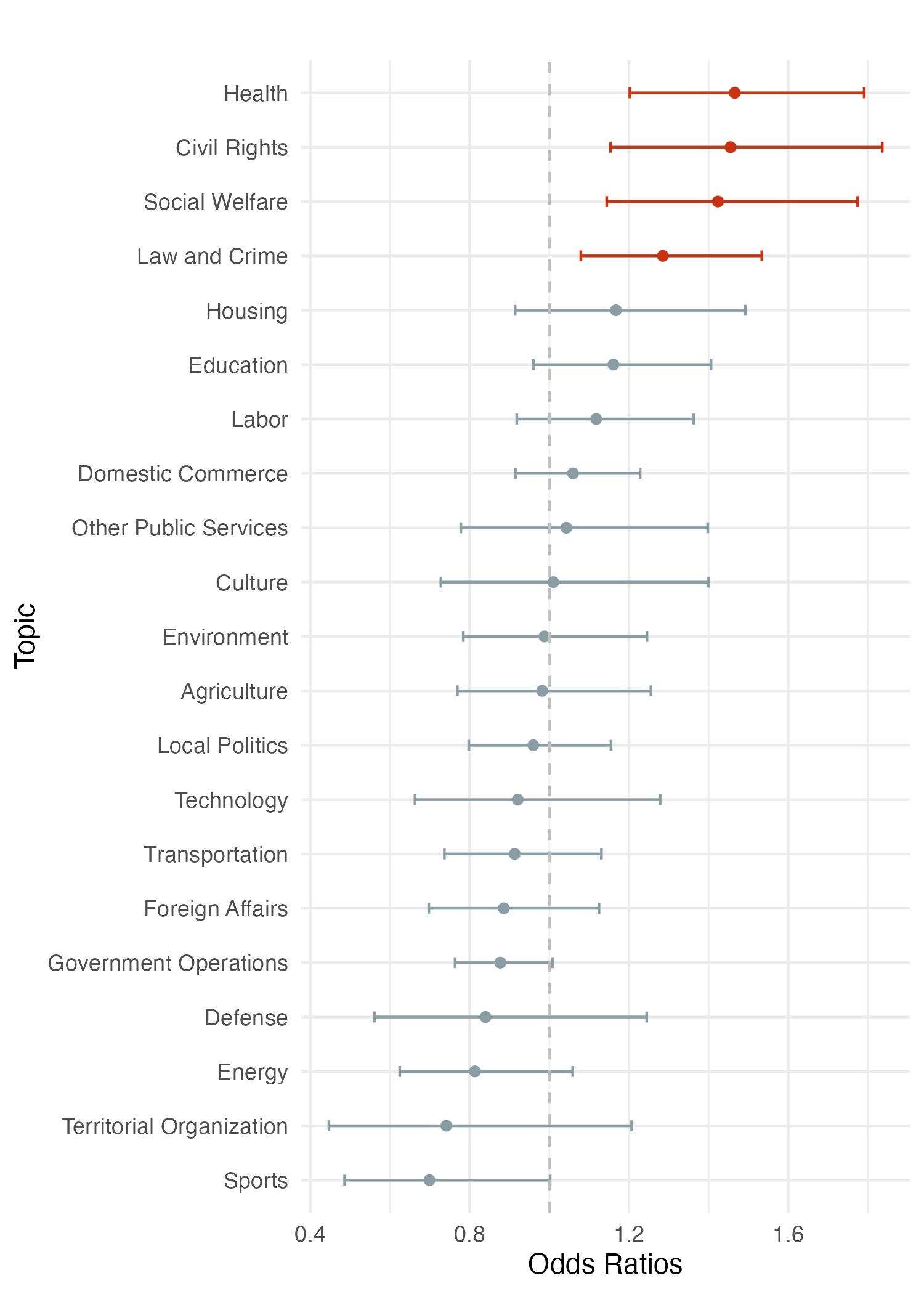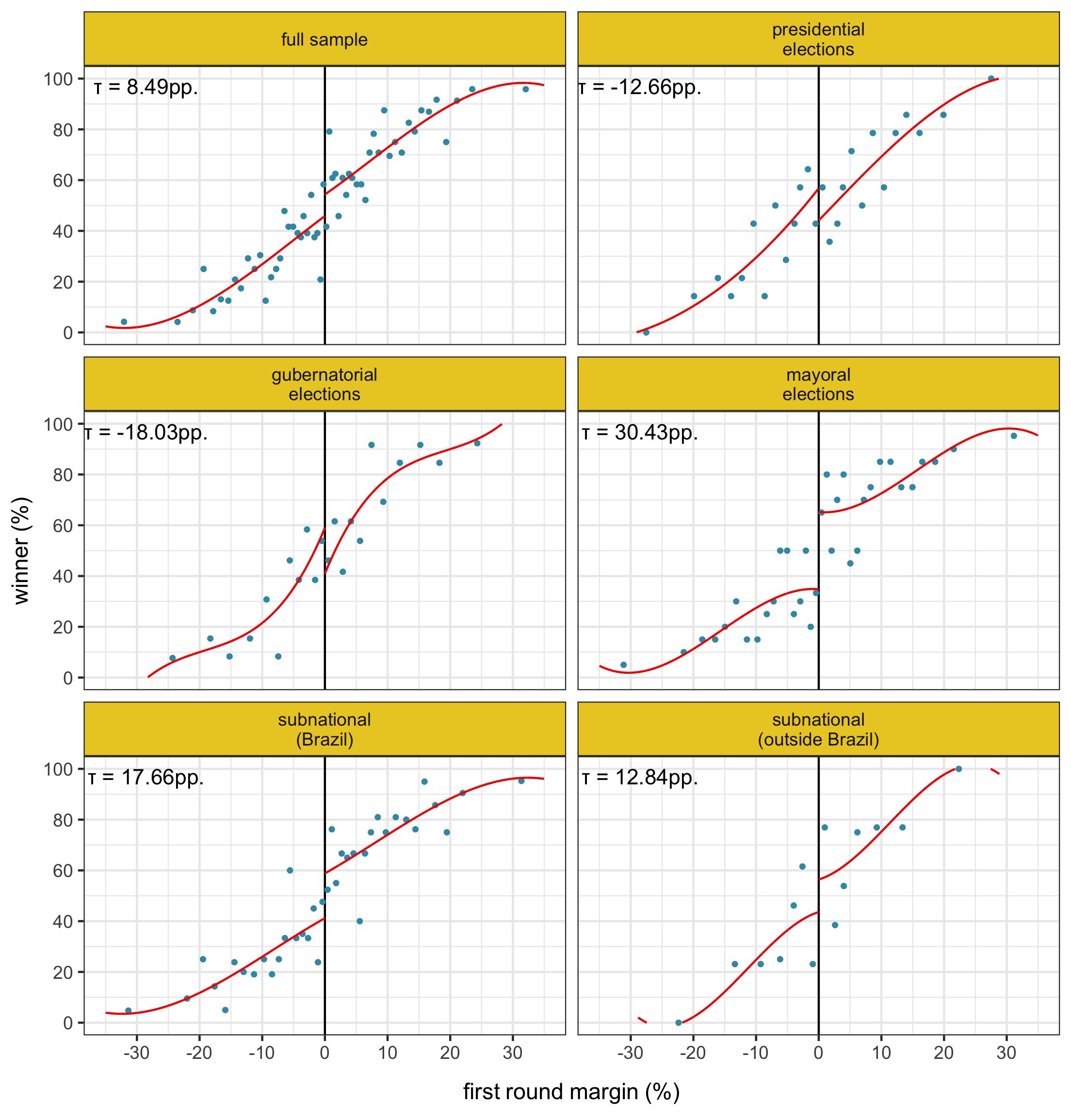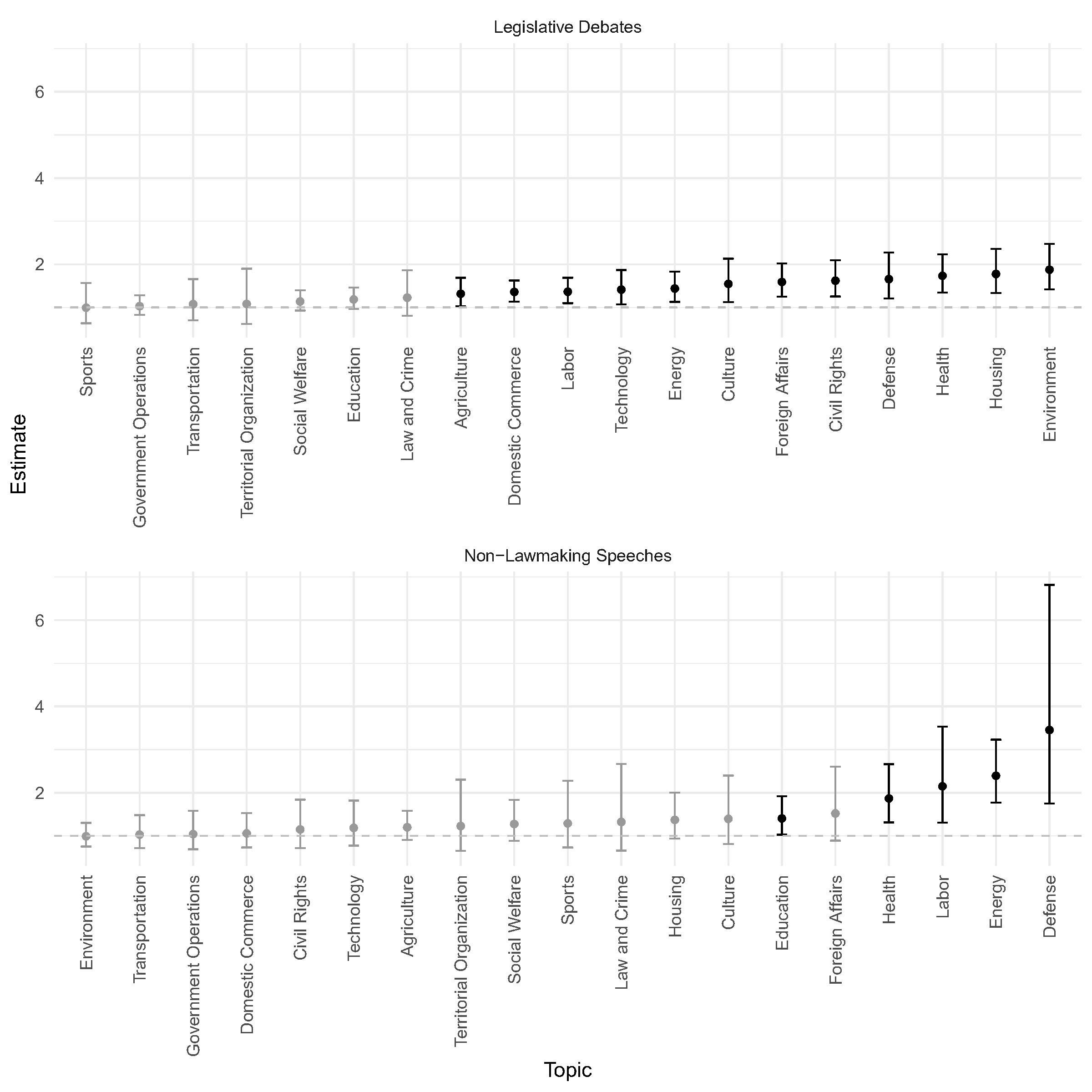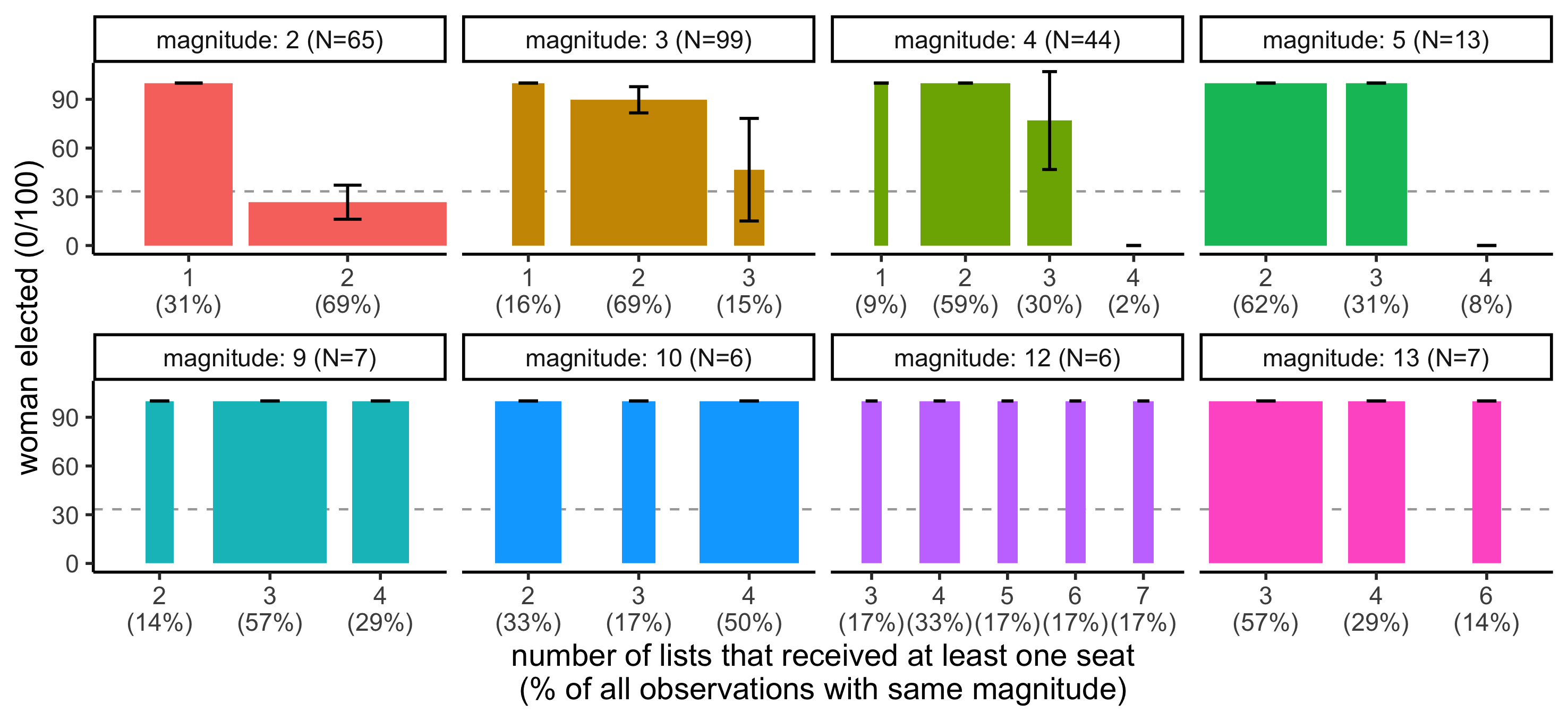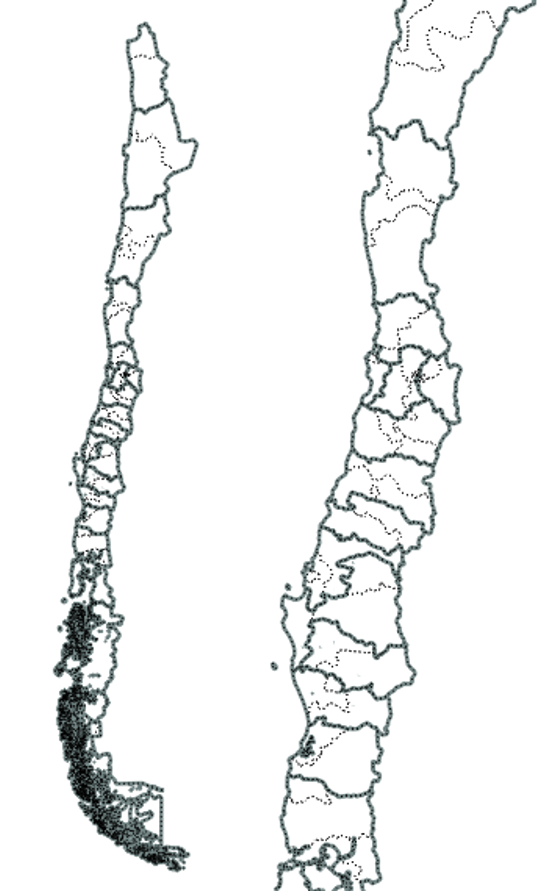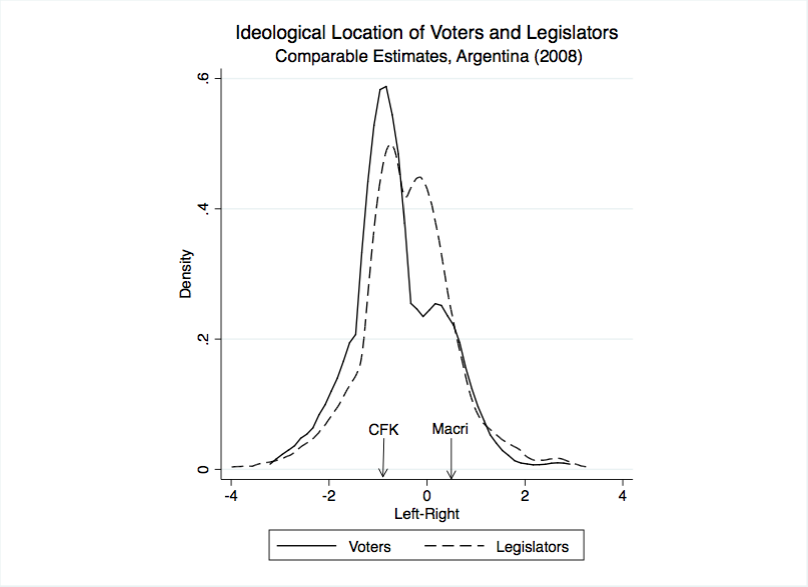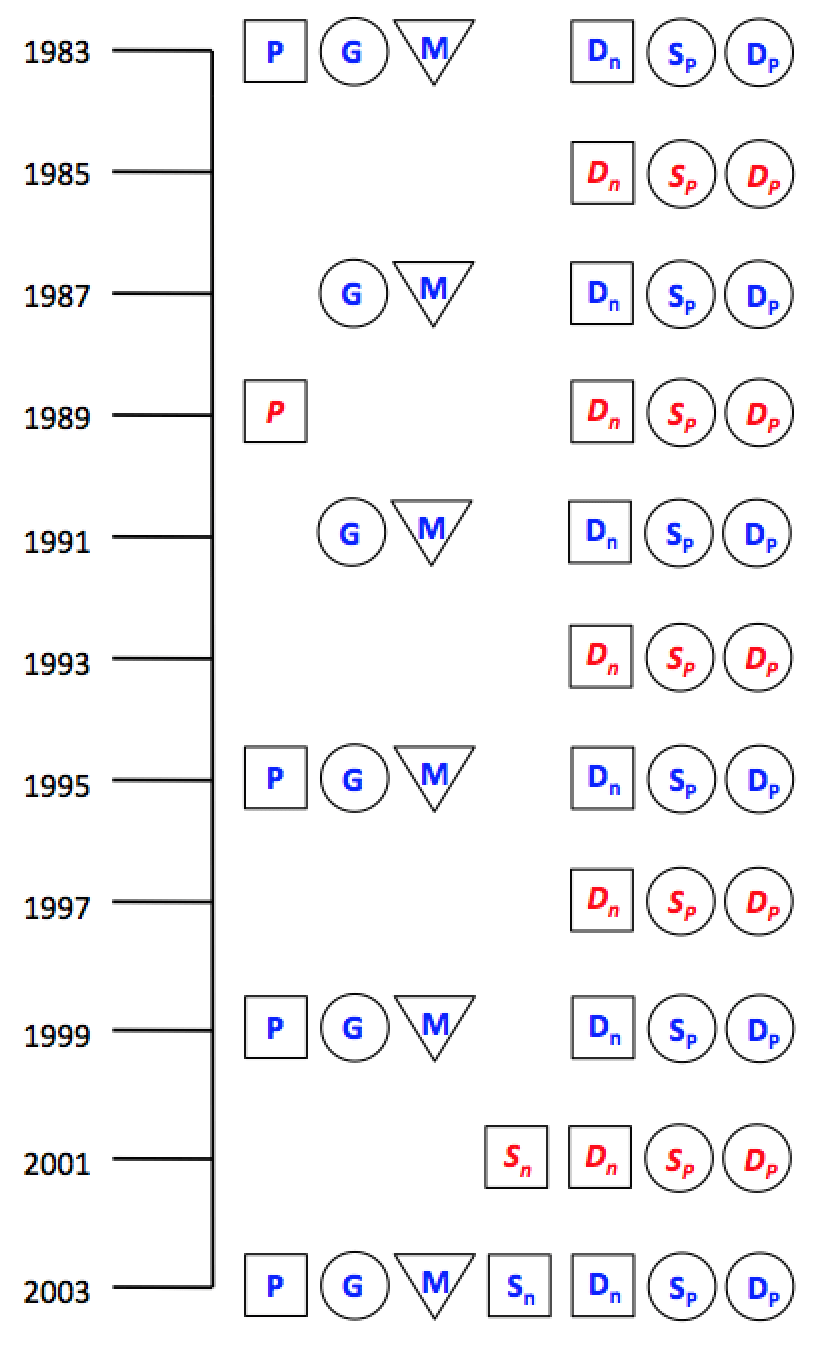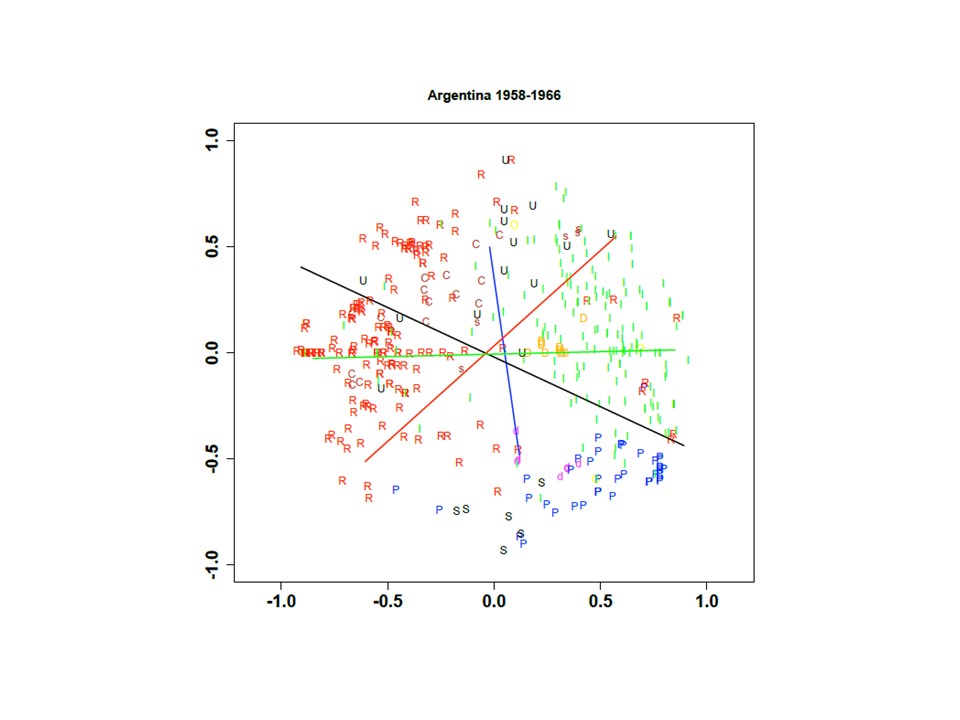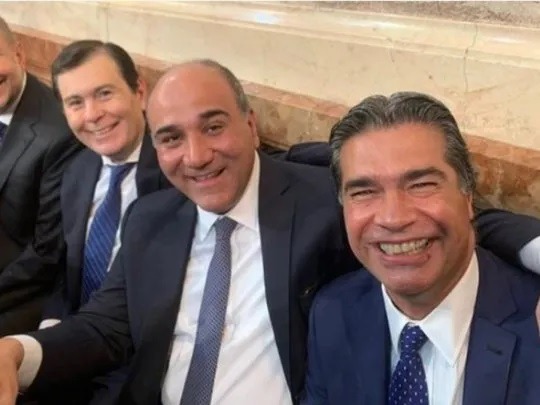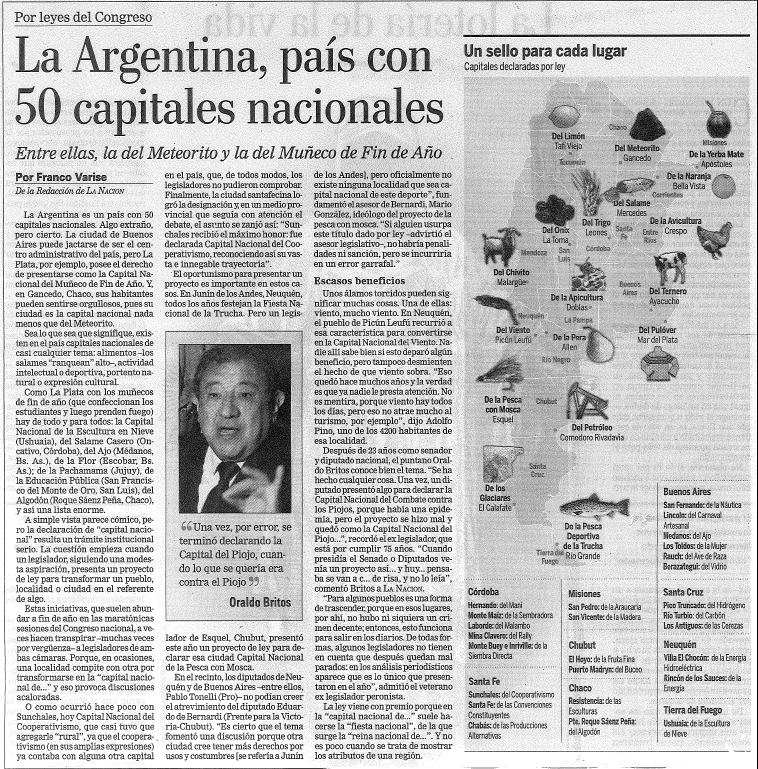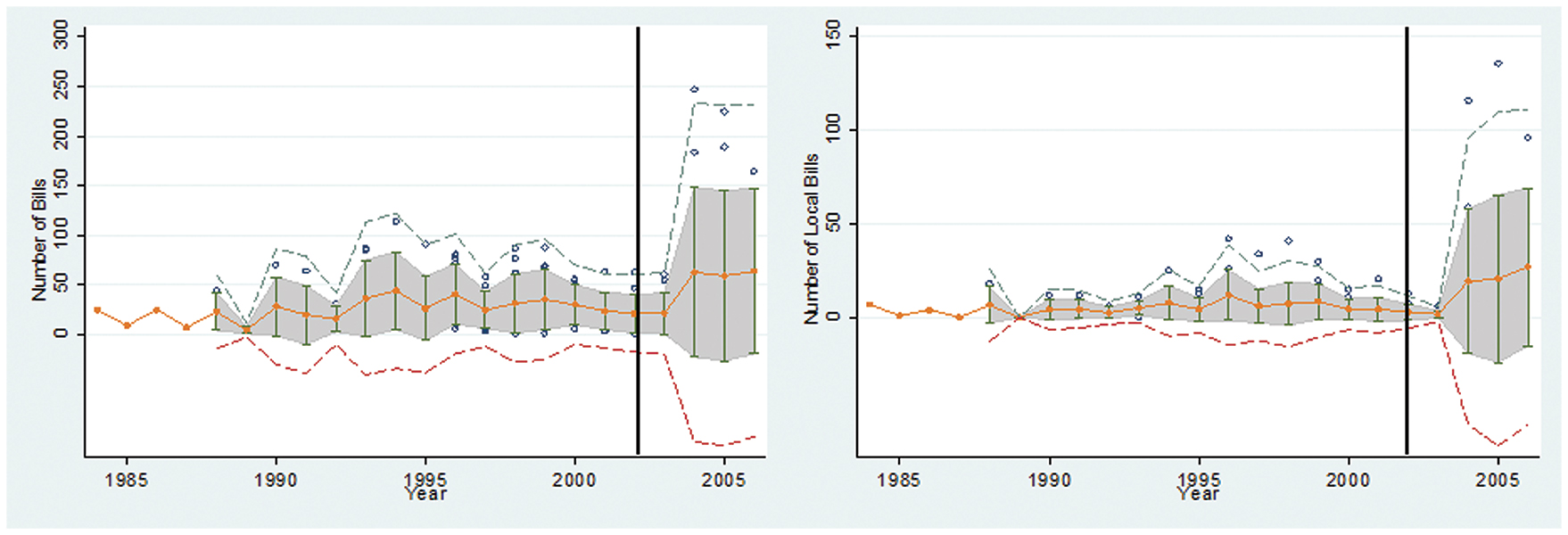Research
Academic Work
Do men and women cover different issues when they can take the word in legislative sessions? Are those topics related to traditional roles and norms, or are they indistinguishable? Utilized sophisticated text analysis techniques, our findings show that, once differences in access to power positions (i.e. committee membership and chairmanship) are taken into account, women do not only not speak less than men in most areas, but also outperform them in key topics such as health, civil rights and welfare
Comparative Politics, 2025. With Eduardo Alemán, Tiffany Barnes and Sebastián Vallejo-Vera
Available upon request
This study examines the impact of political risk on financial markets by leveraging minute-by-minute price data and precise event timestamps from media outlets’ Twitter feeds during Pedro Castillo’s failed coup attempt in Peru. High-frequency data reveal that markets promptly and accurately incorporated news of the coup attempt and, in turn, its failure into asset prices. Our analysis shows that breakdowns in democratic governance negatively affect asset prices, while the restoration of the rule of law, in the form Congressional checks on the Executive branch, boosts them.
Journal of Risk and Financial Management, 2024. With Patricio Navia, Pablo Pinto and Sebastián Saiegh
Runoff systems allow for a reversion of the first-round result. Do voters take advantage of this opportunity, or does winning the first round increase the probability of winning the second? We investigate this question with data from presidential elections since 1945, as well as subnational elections in Latin America. Using a regression discontinuity design, we find that being the most voted candidate in the first round has a substantial positive effect on the probability of winning the second round in mayoral races –especially in Brazil–, but in presidential and gubernatorial elections the effect is negative, though not statistically significant
Electoral Studies, 2023. With Adrián Lucardi and Agustín Vallejo
How do committee specialization and district characteristics affect speech participation and the topics covered? We answer these questions using over 100,000 speeches delivered in the Chilean Chamber of Deputies between 1990 and 2018 through a topic classification model. Consistent with informational theories, we find that committee specialization is a significant predictor of speech participation in legislative debates, while district characteristics have a significant effect on speech participation in non-lawmaking forums.
Political Research Quarterly, 2022. With Eduardo Alemán and Sebastián Vallejo Vera
When (and why) do legislators quit their jobs? Previous answers to this question have focused on retirements. Looking at voluntary resignations instead, we argue that leaving Congress to assume an elected (executive) office or a position in the (sub)national bureaucracy may be a career-advancing move motivated by progressive ambition. We document this claim with data from Argentina, where roughly 12% of elected deputies leave voluntarily before their term ends, but rarely become unemployed. Consistent with expectations, we show that resignations tend to follow instances of executive alternation at the (sub)national level, and are driven by legislators placed at the top of party lists as well as those elected in midterm years
Legislative Studies Quarterly, 2022. With Adrian Lucardi and Natan Skigin
“District Magnitude and Women’s Representation: Evidence from Argentina and Latin America”
It is widely accepted that gender quotas with closed-lists PR improve the election of women, especially in high district magnitudes. However, the net effect of magnitude has been unclear, as adding seats may increase fragmentation, which might therefore end up favoring the election of more men. Making use of natural quasi-experiments in Argentina as well as observational data from all of Latin America, the piece shows that increasing magnitude favors the representation of women only if fragmentation is avoided, as party magnitud mediates the main effects.
American Journal of Political Science, 2022. With Adrian Lucardi.
What is the value of a legislative position in an environment where ambition is progressive? Through the creation of a large dataset on political careers and electoral results, we demonstrate that a seat is not a sprongboard to executive position, but definitely a window to enter and remain in the big political game.
Political Science Research and Methods, 2020. With Adrian Lucardi.
Do workers represent workers in Congress? What happens to their group’s representation when the defense of their insterests is claimed by a populist party with labor ties, but also other parties include union members in their delegations? Using a database of legislators’ background and performing text analysis over more than 100,000 bills, the piece shows that workers are represented by subjects with labor ties in Argentina, regardless of partisanship. Relatedly, members of the alleged party of the workers do not care at all about the group unless they have explicit memebrship to the unions.
Latin American Politics and Society, 2018
How do legislators increase individual visibility in cases where resources are scarce and parties dominate most activities? We analyze a legislative activity that has been understudied in presidential designs, parliamentary questions, and show that they are strategically utilized by marginal legislators to improve their prospective chances.
Journal of Legislative Studies, 2018. With Eduardo Aleman and Margarita Ramirez.
We combine roll call votes, elite surveys, and public opinion data to disentangle the main determinants of floor votes in the Argentine Congress. In line with the literature, we find that party pressures explain most of the decisions, leaving a narrow margin of influence of ideology and the preferences of local district’s voters.
Legislative Studies Quarterly, 2018. With Eduardo Aleman, Pablo Pinto and Sebastian Saiegh.
The electoral calendar is a likely source of variation to test many aspects of political dynamics. This work shows that the particular renewal sequence of the Argentine Chamber of Deputies (half of the members every two years) affects the kinds of politicians who run and are elected. Evidence demonstrates that more experienced politicians tend to run during concurrent elections with the presidency, while also show more bill productivity than their peers.
Legislative Studies Quarterly, 2018. With Adrian Lucardi
We evaluate Guillermo O’Donnell’s argument about an *impossible game* in Argentina and, after analyzing roll call votes of the era, find a different explanation for the same conclusion. Rather than the impossibility of reaching an equilibrium, the chronic instability was the product of the multiplicity of possible solutions to the game. Thus, actors chose to adopt positions that could be overturned by alternative coalitions across time, thereby making democracy not a stable outcome.
Journal of Theoretical Politics, 2016. With Sebastian Saiegh
While the literature used network analyses to analyse cosponsorship behavior, no study had linked legislators’ decisions to cooperate in drafting bills as a function of political ambition. This piece shows that legislators who expect to become governors in the next run decide to tie their hands and cosponsor more together, regardless of their partisanship. In parallel, those deputies who expect righ the same spot immediately tend to ignore each other, rather than systematically not cooperate.
Comparative Political Studies, 2014
Argentina has one of the highest flows of bill introduction worldwide, too big to think it is a random process. This piece links the drafting of bills with multilevel political ambition. Through the creation of a large database of bills and a map of careers, the piece show that legislators expecting to become municipal mayors tend to inflate the volume of locally targeted bills drafted during their tenure.
Journal of Legislative Studies, 2014.
Should changes in the method of selecting representatives affect their behavior?? The replacement of state-level nomination by popular election of Argentine Senators in 2001 made observers expect a performance more responsive to provincial voters. This piece shows that, in fact, legislators that were voted increased their congressional workload, systematically drafting more bills and dedicating more projects to target their state-level constituents.
Journal of Politics, 2013
The Uruguayan system is well-known for being party-centered and for legislators’ reelection-seeking behavior. This paper looks at the growing progressive ambition that became the norm after 2000, where an increasing number of legislators attempted to jump to their local governorships (intendencias) from their seats. We find evidence that progressively ambitious deputies tend to draft more bills with local content then their peers, especially those from small and rural districts.
Legislative Studies Quarterly, 2014. With Daniel Chasquetti
“Political Regimes and Politicians’ Behavior: Evidence from Mexican Legislators.”
Are politicians elected in free and fair elections necessarily more responsive to voters than those who serve in non-fully democratic environments? We make use of the particular transition to democracy en Mexico, where clean elections progressively started at the state level, and the number of legislators who occupied a seat before and after the democratization is considerable. We evaluate patterns of bill sponsorship, cosponsorship and other indicators of performance to infer (expected) variation in behavior
With Adrian Lucardi and Jeffrey Weldon
“Genuflection, Group Representation, or Both? Unfolding Congressional Behavior in an Authoritarian Legislature: The Case of the Hegemonic (yet Group-Based) PRI”
While conventional views of the former dominant Mexican PRI highlight its top-down structure, a closer reading shows that it was based on the support of different groupd with strong prerogatives. Peasants (CNC), labor unions (CTM), middle-class organizations (CNOP) and even governors had the right of nominating legislative candidates, a fact that suggests a classic competing principals dilemma. Through a recognition effort of of the group origins of each deputy (not previously compiled) and the creation of a database of bills and amendments drafted, the piece seeks to assess if there were patterns of targeted representation coexisting with the strict party discipline in the partially democratic Mexico.
“Party Monitors and Election Integrity: Evidence from Argentina”
While the secret ballot is supposed to ensure the integrity of the vote, in many developing countries, parties still spend substantial resources to mobilize voters to the polls and monitor the vote count. Does the presence of monitors make a difference in the election results? Using more than 100,000 telegrams of the 2023 presidential election in Argentina, we assess the impact of the presence/absence of fiscalization in polling stations within same schools over parties’ electoral performance
With Adrian Lucardi and Eduardo Alemán
“Panquequeando por un Sueldo: Shape-Shifting Representation in Latin America.”
We rely on the concept of policy-making beta to assess the extent to which politicians are prone to chenging their policy positions once in office. We measure their cross-temporal consistency making use of the elites’ survey series developed by PELA at Universidad de Salamanca
With Patricio Navia, Pablo Pinto and Sebastián Saiegh
“Legislative Behavior under Multiple Regime Transitions: The Case of Brazil (1954-2024)”
Regime transitions do not always imply a complete disappearance of previous rulers. How do these elites behave after having survived regime change? We analyze the Brazilian Camara dos Deputados between 1954 and 2024, which remained in place even after each of the two different regime transitions in the period (1964 and 1985). Making use of the high levels of stability of membership across regimes, we assess whether patterns of bill drafting, amendments, and position takings varied after each critical change
With Adrián Lucardi and Emilia Simison
“Who speaks for the poor? Representation without inclusion in the Chilean Congress”
If there was a legislative body characterized by high levels of wealth and education in its membership, it was Chile. However, appeals to poor people was not a rare event in regular sessions. Who tried to forge representation of such an absent group in the public sphere? Using 28 years of legislative speeches, we attempt to disentangle whether it was ideology, districts’ demographics, or electoral vulnerability what triggered actions on behalf of economically marginalized groups.
With Eduardo Alemán and Sebastián Vallejo-Vera
“Progressive Ambition in a Static World: Climbing Up in the Chilean Congress – 1990-2018.”
Chile is a country where reelection rates in the Chamber of Deputies ranked at the top of most presidential regimes. However, patterns of progress can be recognized in the attempts to jump to the Senate. Do these individuals who try to become senators change the scope of their legislative activities, trying to reach a broader electorate? We analyze parliamentary speeches delivered to the floor during the 28 years of the binomial system. Preliminary findings suggest that progressive ambition is, in fact, a central factor affecting the delivery of targeted ‘oficios’ to the related senatorial constituency.
With Eduardo Aleman
“What do you see when you see me? An Experiment Gender, Candidates’ Names, and Support for Women’s Issues in Argentina.”
While it is a fact that women have won considerable space in political activities throughout the last decades, there is still uncertainty about their behavior in office, and also about who feels substantively represented by different knids of female officers. We center our analysis in how different features of women’s names (use of maiden or married names, nicknames, older or younger names, names belonging to a dynasty) affect voters’ perceptions about the candidates and their proposals. Through a conjoint experiment, we expect to find variation in the reactions of dissimilar targets of citizens over women’s rights proposals made by different combinations of names.
With Adrian Lucardi
“Does Money call Money? Unfolding Political, Economic and Social Elites in Argentina.”
Through the use of an original dataset of elites at the political, social and private sector levels, we test traditional theories of political sociology and analyze if a position of leadership in one area increases the chances of succeeding in the other ones. Alongside, we evaluate how sensitive the leadership in each sector is to political and economic shocks.
With Sebastián Saiegh and Adrián Lucardi
Do men and women cover different issues when they can take the word in legislative sessions? Are those topics related to traditional roles and norms, or are they indistinguishable? Utilized sophisticated text analysis techniques, our findings show that, once differences in access to power positions (i.e. committee membership and chairmanship) are taken into account, women do not only not speak less than men in most areas, but also outperform them in key topics such as health, civil rights and welfare
Comparative Politics, 2025. With Eduardo Alemán, Tiffany Barnes and Sebastián Vallejo-Vera
Available upon request
This study examines the impact of political risk on financial markets by leveraging minute-by-minute price data and precise event timestamps from media outlets’ Twitter feeds during Pedro Castillo’s failed coup attempt in Peru. High-frequency data reveal that markets promptly and accurately incorporated news of the coup attempt and, in turn, its failure into asset prices. Our analysis shows that breakdowns in democratic governance negatively affect asset prices, while the restoration of the rule of law, in the form Congressional checks on the Executive branch, boosts them.
Journal of Risk and Financial Management, 2024. With Patricio Navia, Pablo Pinto and Sebastián Saiegh
Runoff systems allow for a reversion of the first-round result. Do voters take advantage of this opportunity, or does winning the first round increase the probability of winning the second? We investigate this question with data from presidential elections since 1945, as well as subnational elections in Latin America. Using a regression discontinuity design, we find that being the most voted candidate in the first round has a substantial positive effect on the probability of winning the second round in mayoral races –especially in Brazil–, but in presidential and gubernatorial elections the effect is negative, though not statistically significant
Electoral Studies, 2023. With Adrián Lucardi and Agustín Vallejo
How do committee specialization and district characteristics affect speech participation and the topics covered? We answer these questions using over 100,000 speeches delivered in the Chilean Chamber of Deputies between 1990 and 2018 through a topic classification model. Consistent with informational theories, we find that committee specialization is a significant predictor of speech participation in legislative debates, while district characteristics have a significant effect on speech participation in non-lawmaking forums.
Political Research Quarterly, 2022. With Eduardo Alemán and Sebastián Vallejo Vera
When (and why) do legislators quit their jobs? Previous answers to this question have focused on retirements. Looking at voluntary resignations instead, we argue that leaving Congress to assume an elected (executive) office or a position in the (sub)national bureaucracy may be a career-advancing move motivated by progressive ambition. We document this claim with data from Argentina, where roughly 12% of elected deputies leave voluntarily before their term ends, but rarely become unemployed. Consistent with expectations, we show that resignations tend to follow instances of executive alternation at the (sub)national level, and are driven by legislators placed at the top of party lists as well as those elected in midterm years
Legislative Studies Quarterly, 2022. With Adrian Lucardi and Natan Skigin
“District Magnitude and Women’s Representation: Evidence from Argentina and Latin America”
It is widely accepted that gender quotas with closed-lists PR improve the election of women, especially in high district magnitudes. However, the net effect of magnitude has been unclear, as adding seats may increase fragmentation, which might therefore end up favoring the election of more men. Making use of natural quasi-experiments in Argentina as well as observational data from all of Latin America, the piece shows that increasing magnitude favors the representation of women only if fragmentation is avoided, as party magnitud mediates the main effects.
American Journal of Political Science, 2022. With Adrian Lucardi.
What is the value of a legislative position in an environment where ambition is progressive? Through the creation of a large dataset on political careers and electoral results, we demonstrate that a seat is not a sprongboard to executive position, but definitely a window to enter and remain in the big political game.
Political Science Research and Methods, 2020. With Adrian Lucardi.
Do workers represent workers in Congress? What happens to their group’s representation when the defense of their insterests is claimed by a populist party with labor ties, but also other parties include union members in their delegations? Using a database of legislators’ background and performing text analysis over more than 100,000 bills, the piece shows that workers are represented by subjects with labor ties in Argentina, regardless of partisanship. Relatedly, members of the alleged party of the workers do not care at all about the group unless they have explicit memebrship to the unions.
Latin American Politics and Society, 2018
How do legislators increase individual visibility in cases where resources are scarce and parties dominate most activities? We analyze a legislative activity that has been understudied in presidential designs, parliamentary questions, and show that they are strategically utilized by marginal legislators to improve their prospective chances.
Journal of Legislative Studies, 2018. With Eduardo Aleman and Margarita Ramirez.
We combine roll call votes, elite surveys, and public opinion data to disentangle the main determinants of floor votes in the Argentine Congress. In line with the literature, we find that party pressures explain most of the decisions, leaving a narrow margin of influence of ideology and the preferences of local district’s voters.
Legislative Studies Quarterly, 2018. With Eduardo Aleman, Pablo Pinto and Sebastian Saiegh.
The electoral calendar is a likely source of variation to test many aspects of political dynamics. This work shows that the particular renewal sequence of the Argentine Chamber of Deputies (half of the members every two years) affects the kinds of politicians who run and are elected. Evidence demonstrates that more experienced politicians tend to run during concurrent elections with the presidency, while also show more bill productivity than their peers.
Legislative Studies Quarterly, 2018. With Adrian Lucardi
We evaluate Guillermo O’Donnell’s argument about an *impossible game* in Argentina and, after analyzing roll call votes of the era, find a different explanation for the same conclusion. Rather than the impossibility of reaching an equilibrium, the chronic instability was the product of the multiplicity of possible solutions to the game. Thus, actors chose to adopt positions that could be overturned by alternative coalitions across time, thereby making democracy not a stable outcome.
Journal of Theoretical Politics, 2016. With Sebastian Saiegh
While the literature used network analyses to analyse cosponsorship behavior, no study had linked legislators’ decisions to cooperate in drafting bills as a function of political ambition. This piece shows that legislators who expect to become governors in the next run decide to tie their hands and cosponsor more together, regardless of their partisanship. In parallel, those deputies who expect righ the same spot immediately tend to ignore each other, rather than systematically not cooperate.
Comparative Political Studies, 2014
Argentina has one of the highest flows of bill introduction worldwide, too big to think it is a random process. This piece links the drafting of bills with multilevel political ambition. Through the creation of a large database of bills and a map of careers, the piece show that legislators expecting to become municipal mayors tend to inflate the volume of locally targeted bills drafted during their tenure.
Journal of Legislative Studies, 2014.
Should changes in the method of selecting representatives affect their behavior?? The replacement of state-level nomination by popular election of Argentine Senators in 2001 made observers expect a performance more responsive to provincial voters. This piece shows that, in fact, legislators that were voted increased their congressional workload, systematically drafting more bills and dedicating more projects to target their state-level constituents.
Journal of Politics, 2013
The Uruguayan system is well-known for being party-centered and for legislators’ reelection-seeking behavior. This paper looks at the growing progressive ambition that became the norm after 2000, where an increasing number of legislators attempted to jump to their local governorships (intendencias) from their seats. We find evidence that progressively ambitious deputies tend to draft more bills with local content then their peers, especially those from small and rural districts.
Legislative Studies Quarterly, 2014. With Daniel Chasquetti
“Political Regimes and Politicians’ Behavior: Evidence from Mexican Legislators.”
Are politicians elected in free and fair elections necessarily more responsive to voters than those who serve in non-fully democratic environments? We make use of the particular transition to democracy en Mexico, where clean elections progressively started at the state level, and the number of legislators who occupied a seat before and after the democratization is considerable. We evaluate patterns of bill sponsorship, cosponsorship and other indicators of performance to infer (expected) variation in behavior
With Adrian Lucardi and Jeffrey Weldon
“Genuflection, Group Representation, or Both? Unfolding Congressional Behavior in an Authoritarian Legislature: The Case of the Hegemonic (yet Group-Based) PRI”
While conventional views of the former dominant Mexican PRI highlight its top-down structure, a closer reading shows that it was based on the support of different groupd with strong prerogatives. Peasants (CNC), labor unions (CTM), middle-class organizations (CNOP) and even governors had the right of nominating legislative candidates, a fact that suggests a classic competing principals dilemma. Through a recognition effort of of the group origins of each deputy (not previously compiled) and the creation of a database of bills and amendments drafted, the piece seeks to assess if there were patterns of targeted representation coexisting with the strict party discipline in the partially democratic Mexico.
“Party Monitors and Election Integrity: Evidence from Argentina”
While the secret ballot is supposed to ensure the integrity of the vote, in many developing countries, parties still spend substantial resources to mobilize voters to the polls and monitor the vote count. Does the presence of monitors make a difference in the election results? Using more than 100,000 telegrams of the 2023 presidential election in Argentina, we assess the impact of the presence/absence of fiscalization in polling stations within same schools over parties’ electoral performance
With Adrian Lucardi and Eduardo Alemán
“Panquequeando por un Sueldo: Shape-Shifting Representation in Latin America.”
We rely on the concept of policy-making beta to assess the extent to which politicians are prone to chenging their policy positions once in office. We measure their cross-temporal consistency making use of the elites’ survey series developed by PELA at Universidad de Salamanca
With Patricio Navia, Pablo Pinto and Sebastián Saiegh
“Legislative Behavior under Multiple Regime Transitions: The Case of Brazil (1954-2024)”
Regime transitions do not always imply a complete disappearance of previous rulers. How do these elites behave after having survived regime change? We analyze the Brazilian Camara dos Deputados between 1954 and 2024, which remained in place even after each of the two different regime transitions in the period (1964 and 1985). Making use of the high levels of stability of membership across regimes, we assess whether patterns of bill drafting, amendments, and position takings varied after each critical change
With Adrián Lucardi and Emilia Simison
“Who speaks for the poor? Representation without inclusion in the Chilean Congress”
If there was a legislative body characterized by high levels of wealth and education in its membership, it was Chile. However, appeals to poor people was not a rare event in regular sessions. Who tried to forge representation of such an absent group in the public sphere? Using 28 years of legislative speeches, we attempt to disentangle whether it was ideology, districts’ demographics, or electoral vulnerability what triggered actions on behalf of economically marginalized groups.
With Eduardo Alemán and Sebastián Vallejo-Vera
“Progressive Ambition in a Static World: Climbing Up in the Chilean Congress – 1990-2018.”
Chile is a country where reelection rates in the Chamber of Deputies ranked at the top of most presidential regimes. However, patterns of progress can be recognized in the attempts to jump to the Senate. Do these individuals who try to become senators change the scope of their legislative activities, trying to reach a broader electorate? We analyze parliamentary speeches delivered to the floor during the 28 years of the binomial system. Preliminary findings suggest that progressive ambition is, in fact, a central factor affecting the delivery of targeted ‘oficios’ to the related senatorial constituency.
With Eduardo Aleman
“What do you see when you see me? An Experiment Gender, Candidates’ Names, and Support for Women’s Issues in Argentina.”
While it is a fact that women have won considerable space in political activities throughout the last decades, there is still uncertainty about their behavior in office, and also about who feels substantively represented by different knids of female officers. We center our analysis in how different features of women’s names (use of maiden or married names, nicknames, older or younger names, names belonging to a dynasty) affect voters’ perceptions about the candidates and their proposals. Through a conjoint experiment, we expect to find variation in the reactions of dissimilar targets of citizens over women’s rights proposals made by different combinations of names.
With Adrian Lucardi
“Does Money call Money? Unfolding Political, Economic and Social Elites in Argentina.”
Through the use of an original dataset of elites at the political, social and private sector levels, we test traditional theories of political sociology and analyze if a position of leadership in one area increases the chances of succeeding in the other ones. Alongside, we evaluate how sensitive the leadership in each sector is to political and economic shocks.
